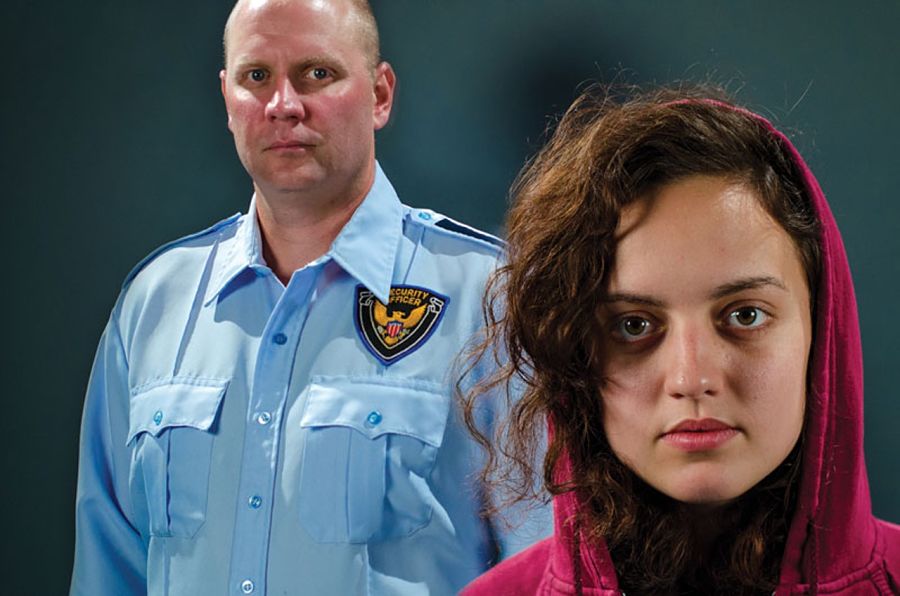NASHVILLE: The national conversation around police officer-involved shootings and their aftermath is often very polarizing, but Nashville Repertory Theatre hopes the world premiere of Nate Eppler’s Good Monsters, which runs Feb. 11–27, will provide a theatrical perspective beyond recent headlines and explore the humanity of those involved.
“For me, it’s always been about theatre as an empathy machine,” says Nashville Rep’s producing artistic director, René D. Copeland, who is also directing the production. “What we can do to better humanity as theatre artists is make ourselves better human beings by making ourselves more empathetic people,”
The psychological drama follows Frank, an off-duty Tennessee cop who fatally shot an unarmed 16-year-old shoplifter, a Kuwaiti-born girl named Safira, aka “Zero.” Frank’s wife and police partner want Frank to put it behind him and move on, but a remorseful Frank is having problems leaving the incident behind, since Zero’s ghost is haunting him and her adopted father wants to kill himself in Frank’s backyard. He’s also harassed by a Gloria Allred-like lawyer named Josie, whose media-savvy ways are repulsive to Frank.
“The ghost is the core of the story for me for sure; it’s what made me decide to write the play,” says Eppler. “Writing about Frank as a character and that [shooting] really mattered, but thinking about him being literally haunted by it is when I started thinking, ‘Okay, now this is a play.’ The purgatorial nature of this story really opened the play up for me.”
Good Monsters may be very topical, but Eppler does not consider it a “ripped from the headlines” project. As the company’s playwright-in-residence, he started writing the play more than two years ago as part of the theatre’s 2013–14 Ingram New Works Project program. “It was kind of shocking, because when I started, there wasn’t much out there; now The Washington Post just completed a year-long study on officer-involved shootings,” Eppler says. “This is not a new topic—over-policing is not new, these types of events are not new—but our growing relationship with them in the cultural discourse is new.”
The play had staged readings at the 2014 Ingram New Works Festival, and in 2015, community stakeholders—a police officer, an academic, a journalist, counselors, an attorney, and current and former members of the armed forces—gave feedback at a workshop of the piece. “There were some significant changes that somewhat altered the trajectory and focus of the play, but for the most part it’s been about sharpening it,” Eppler adds.
In the play, the lawyer Josie tells Frank: “For the rest of your life you’re going to be the man who shot that girl. The next few months will determine if you’re the racist monster who shot that girl or the hero cop who shot that girl.”
“What turns him off about Josie is that she’s talking about making him a hero,” says Nat McIntyre, who plays Frank in the production and has been a part of the play’s developmental process for the past two years. “That’s the last thing he wants.”
McIntyre is also looking for empathy for the troubled man he portrays. “He’s a person in our culture that’s often not valued, a person of principle that does want to serve and cares about his community,” he explains. “I’ve always respected that guy and tried to be more like him. I like him. I hate what he does and I hate what happens to him, but I liked him from the start.”
For the Nashville Rep production, Gary Hoff designed the set, Rep favorite Trish Clark provided the costumes, Darren Levin created the lighting schemes, and Ricky Lighthall designed the sound. Colin Peterson designed projections for the piece, including a Fourth of July fireworks display, and technical director Tyler Axt brought in old CRT TVs to display relevant images during the course of the show. Fight coordinator Eric D. Pasto-Crosby provided choreography for various physical altercations that are also relevant to the story.
“The fight choreography and visual effects are as much a part of the plot as anything else—they’re not just bells and whistles,” Eppler adds. “I don’t want to write a story for the theatre that doesn’t embrace a kind of extreme theatricality or magic realism—that’s what I’m into.”
But ultimately, Eppler’s goal in the writing the play was to find understanding where he often finds very little. “He’s an off-duty cop who shoots an unarmed teenage shoplifter in the back, and while I did find empathy, I also found that empathy does not settle accounts,” Eppler said. “Forgiveness does not quiet the dead.”
Evans Donnell is a Nashville-based arts journalist who has also been a theatre producer, director, stage manager, and actor.


